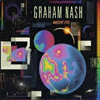GRAHAM NASH : INNOCENT EYES
- See You In Prague
- Keep Away From Me
- Innocent Eyes
- Chippin' Away
- Over The Wall
- Don't Listen To The Rumors
- Sad Eyes
- Newday
- Glass And Steel
- I Got A Rock
Label : Atlantic
Length : 34:10
Released : 1986
Review (AllMusic) : With perennial partner David Crosby in the hoosegow, Graham Nash was somewhat at loose ends in the mid-'80s. He couldn't resurrect Crosby, Stills & Nash or Crosby & Nash, and he had already tried reuniting with the Hollies. But Nash had always had a genius for reinvention, which was what led him from one configuration to another and kept him one step ahead of the oldies circuit. Also, despite his reputation for artistic integrity, he had never been above following musical trends or seeking commercial success, as he did, for example, in moving the Hollies toward psychedelic pop in the late '60s, and as he demonstrated by providing Crosby, Stills & Nash, Crosby, Stills, Nash & Young, and Crosby & Nash with their biggest hit singles. So, it was not really surprising that he would return to his solo career with Innocent Eyes, his first solo album in six years, or that he would try to make the kind of record that would get played on the radio in 1986. That inevitably meant prominent synthesizer keyboards and loud drum programming, and that was the sound of Innocent Eyes, announced immediately on the lead-off track, a sort of spy movie in song written by Davitt Siegerson and Richie Zito called "See You in Prague." The instrumental track might as well have been pulled from a Donna Summer album of a few years earlier. Not all of Innocent Eyes was quite that trendy, but Nash had made his point: At the age of 44, he still felt prepared to compete with contemporary pop stars half his age. It was, as he proclaimed in a song he co-wrote with Craig Doerge, a "Newday," and he didn't want to be the person he was yesterday. Unfortunately, whatever the arrangements, the ten songs on Innocent Eyes, four of them not written by Nash, were not outstanding for the most part. Among the Nash compositions, "Over the Wall," which appeared to be about the Berlin Wall, was effective; "Sad Eyes" was a pretty love song; and "Keep Away from Me" and "Glass and Steel," both of which sounded like they might have concerned Crosby, had a strong cautionary appeal. But even though the title song, written by keyboardist Paul Bliss, saw some radio action, the album didn't have any songs to rank with Nash's best, and his thin, keening tenor wasn't really a good fit with the synthesizer parts, which tended to overwhelm it. Thus, Innocent Eyes was at best a minor Nash album, at worst a misstep.
